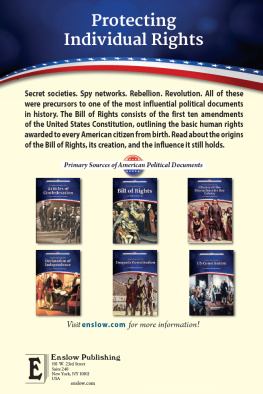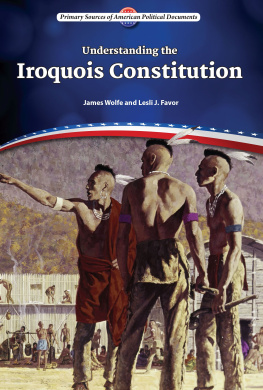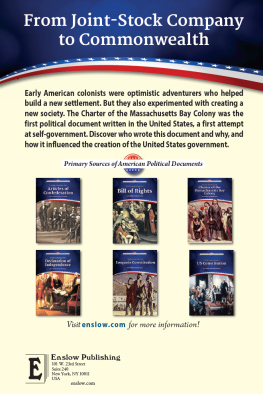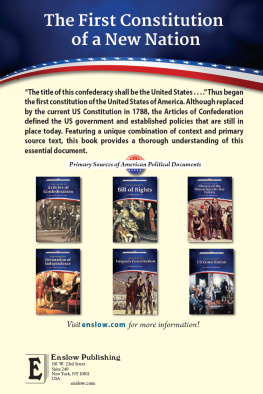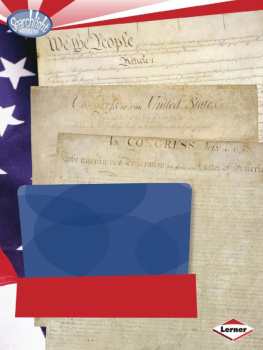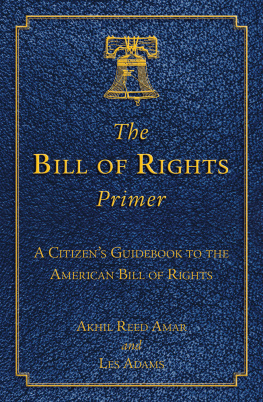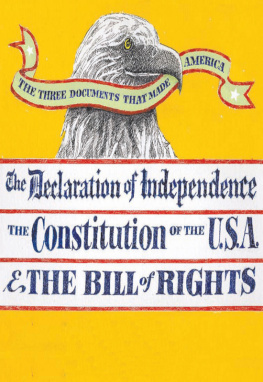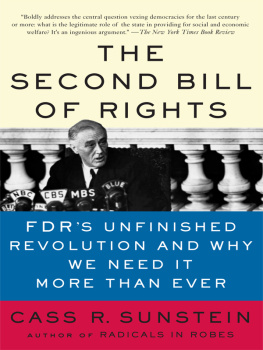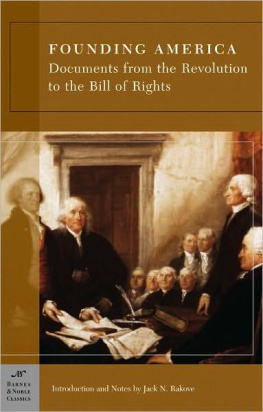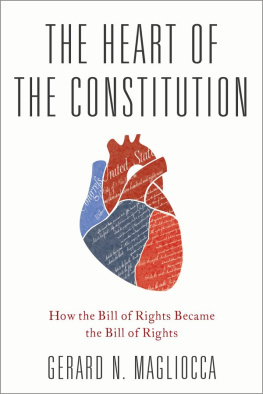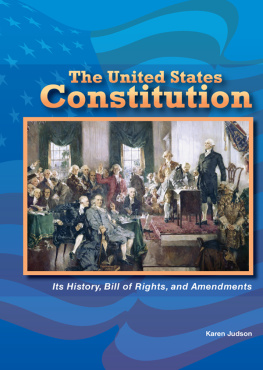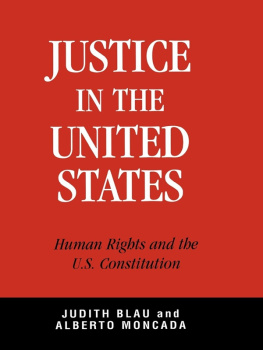James Wolfe - Understanding the Bill of Rights
Here you can read online James Wolfe - Understanding the Bill of Rights full text of the book (entire story) in english for free. Download pdf and epub, get meaning, cover and reviews about this ebook. year: 2015, publisher: Enslow Publishing, LLC, genre: Politics. Description of the work, (preface) as well as reviews are available. Best literature library LitArk.com created for fans of good reading and offers a wide selection of genres:
Romance novel
Science fiction
Adventure
Detective
Science
History
Home and family
Prose
Art
Politics
Computer
Non-fiction
Religion
Business
Children
Humor
Choose a favorite category and find really read worthwhile books. Enjoy immersion in the world of imagination, feel the emotions of the characters or learn something new for yourself, make an fascinating discovery.
- Book:Understanding the Bill of Rights
- Author:
- Publisher:Enslow Publishing, LLC
- Genre:
- Year:2015
- Rating:5 / 5
- Favourites:Add to favourites
- Your mark:
- 100
- 1
- 2
- 3
- 4
- 5
Understanding the Bill of Rights: summary, description and annotation
We offer to read an annotation, description, summary or preface (depends on what the author of the book "Understanding the Bill of Rights" wrote himself). If you haven't found the necessary information about the book — write in the comments, we will try to find it.
Secret societies. Spy networks. Rebellion. Revolution. All of these were precursors to one of the most influential political documents in history. The Bill of Rights consists of the first ten amendments of the United States Constitution, outlining the basic human rights awarded to every American citizen from birth. Read about the origins of the Bill of Rights, its creation, and the influence it still holds.
Understanding the Bill of Rights — read online for free the complete book (whole text) full work
Below is the text of the book, divided by pages. System saving the place of the last page read, allows you to conveniently read the book "Understanding the Bill of Rights" online for free, without having to search again every time where you left off. Put a bookmark, and you can go to the page where you finished reading at any time.
Font size:
Interval:
Bookmark:

Published in 2016 by Enslow Publishing, LLC.
101 W. 23rd Street, Suite 240, New York, NY 10011
Copyright 2016 by Enslow Publishing, LLC.
All rights reserved.
No part of this book may be reproduced by any means without the written permission of the publisher.
Library of Congress Cataloging-in-Publication Data
Wolfe, James, 1960- author.
Understanding the Bill of Rights / James Wolfe and Nancy L. Stair.
pages cm. (Primary sources of American political documents)
Includes bibliographical references and index.
Summary: Discusses the creation and execution of the Bill of Rights in the early days of the United StatesProvided by publisher.
ISBN 978-0-7660-6882-7
1. United States. Constitution. 1st-10th AmendmentsJuvenile literature. 2. Civil rights United StatesJuvenile literature. I. Stair, Nancy L., author. II. Title.
KF4749.W65 2015
342.73085dc23
2015008044
Printed in the United States of America
To Our Readers: We have done our best to make sure all Web site addresses in this book were active and appropriate when we went to press. However, the author and the publisher have no control over and assume no liability for the material available on those Web sites or on any Web sites they may link to. Any comments or suggestions can be sent by e-mail to .
Photo Credits: Aaron Haupt/Science Source/Getty Images, p..
Cover Credits: Superstock/Getty Images (Patrick Henry Addressing the House of Burgesses); Allies Interactive/Shutterstock.com (title splash); Augusto Cabral/Shutterstock.com (logo and spine button).
Contents
Growing Dissatisfaction in America
Breaking Free From England
An Early Constitution
Framing the US Constitution
The First Ten Amendments
Appendix: The Bill of Rights
Glossary
Further Reading
Web Sites
Bibliography
Index
Chapter One
Growing Dissatisfaction in America
Congress shall make no law respecting an establishment of religion, or prohibiting the free exercise thereof; or abridging the freedom of speech, or of the press; or the right of the people peaceably to assemble, and to petition the Government for a redress of grievances.
Article l, Amendments to the US Constitution
T he European colonists who came to the New World did so for different reasons. Some sought religious freedom, while others hoped for better economic opportunities than were available in their homelands. Others were brought as indentured servants or slaves. Their justifications for leaving their mother country had to be strong because living in the new colonies in the seventeenth and eighteenth centuries was extremely difficult. Colonists had to contend with unfamiliar and sometimes harsh climates, strange food, disease, lack of drinkable water, and hostile neighbors.
But the rewards of coming to the New World could also be great. The class system in the Old World, Europe, was very rigid. The class you were born into determined your station in life, your career, and the prospects for your own children. At that point in history, land equaled wealth. The European aristocracy owned most of the land, and most other people worked for them as tenant farmers. In the Americas, people could start fresh, because land was plentiful and there was no aristocracy. The hardships the colonists faced gave them a fierce loyalty to one another, to their colonies, and to the land on which they lived. Far from the king and the harsh class system of England, the settlers felt like free citizens.
Because they were British, the colonists were loyal subjects of the English king, George III. They fought with the British against the French from 1756 to 1763 in the French and Indian War. Known to the English as the Seven Years War, this conflict started in the colonies and expanded to Europe and Asia. In 1763, the English won the war and took over large French holdings of land in North America.

The American colonists sought independence from the tyrannical rule of King George III (17381820).
But in just thirteen years, between 1763 and 1776, the colonists were transformed from loyal subjects to rebels. There were many reasons. Chief among them were the oppressive acts of the English monarchy and the colonists desire for freedom. The wealthy elite of the colonies, the men who would eventually write the laws that formed the United States, had had enough of sharing their wealth with the mother country. They were ready to sever all ties with England and keep their money for themselves.
A Series of Prohibitive Acts
The French and Indian War was a great victory for the British, but it doubled the empires debt. The British Parliament raised taxes throughout the empire, and the American colonies were no exception. In fact, the king felt that since his soldiers were in the colonies to protect the people against foreign and Indian attacks, the colonies should pay more than their fair share of taxes to help support Englands defense budget.
From 1763 through 1765, Parliament enacted several laws that angered the American colonists. The Proclamation of 1763 prevented settlement of the area west of the Appalachians, cutting off the colonists supply of new land. This prevented westward expansion. The Currency Act prohibited the use of paper money for the payment of debt. The Sugar Act placed a tax on goods imported into the colonies, such as sugar, wine, and coffee, and was strictly enforced. The Quartering Act required colonists to board soldiers in their own homes upon demand.

England and France fought the Seven Years War, known commonly as the French and Indian War, over control of North American territory. Britains success in the war brought with it great debt that negatively impacted the American colonies.
These abuses by the British eventually led to the Bill of Rights. The colonists wanted to ensure that they would never again be so exploited and personally violated by their own rulers. Early American mistrust of government power came from the colonial experience itself. Most historians believe that the pivotal event was the Stamp Act, passed by the English Parliament in 1765. This act imposed taxes on all printed documents. The colonists had to purchase authorizing stamps before they could issue newspapers, books, pamphlets, legal documents, and even marriage licenses and playing cards. The Stamp Act so enraged the colonists that they decided they had to fight back against the oppression of the British government.
Even more than the laws themselves, the colonists resented the fact that these taxes were imposed by a distant government in which they were not represented. For years, British soldiers had lived in the midst of the colonies and intimidated the settlers. Furthermore, British soldiers stationed in the colonies could demand to stay in anyones home. The colonists were further enraged by the way in which the Stamp Act was enforced.
Armed with writs of assistance issued by Parliament, British customs inspectors entered peoples homes even if they had no evidence of a Stamp Act violation. These soldiers ransacked the peoples belongings in search of papers without stampsand whatever else they could find. The colonists hated these searches, which became a rallying point for opposition to British rule. These searches eventually led the Founding Fathers to pass the Fourth Amendment of the Bill of Rights, which prevents unreasonable search and seizure.
Font size:
Interval:
Bookmark:
Similar books «Understanding the Bill of Rights»
Look at similar books to Understanding the Bill of Rights. We have selected literature similar in name and meaning in the hope of providing readers with more options to find new, interesting, not yet read works.
Discussion, reviews of the book Understanding the Bill of Rights and just readers' own opinions. Leave your comments, write what you think about the work, its meaning or the main characters. Specify what exactly you liked and what you didn't like, and why you think so.

